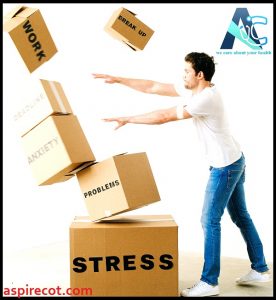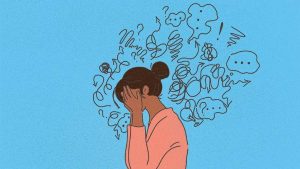How to know if anxiety is too much and how to deal with anxiety disorder?

How to know if anxiety is too much and what to do about it?
Introduction
Anxiety is a common feeling. It’s your brain’s way of coping with stress and notifying you about potential dangers. Anxiety is something that most people experience at some point in their life. Everyone experiences anxiety from time to time. Anxiety disorder victims frequently experience excessive, strong, and persistent anxiety and despair in everyday situations. Anxiety disorders are frequently characterized by persistent symptoms of acute anxiety, fear, or terror that peak within moments.

How to know if anxiety is too much
What is anxiety?
The American Psychological Association (APA) defines anxiety as an emotion characterized by feelings of tension, worried thoughts, and physical changes like increased blood pressure.’
Fear, despair, and unease are all symptoms of anxiety. It is a person’s overall reaction to a risk or threat. Anxiety is characterized by thoughts of harm, a sensation of danger, and a physiological alert and activation mechanism. It can make you sweat, feel nervous, tense, and restless, and cause your heart to race. It’s conceivable that it is indeed a natural stress reflex. You may feel uneasy when confronted with a difficult scenario at the workplace, before taking an exam, or before making a critical decision. You may feel more energized or able to concentrate if you’re anxious. On the other hand, anxiety is continuous and can be overwhelming in people suffering from anxiety disorders.
Symptoms of anxiety disorder
Typical anxiety symptoms and indications include:
- Sweating
- Trembling
- difficulty sleeping
- difficulty focusing or thinking about anything but the current problem
- having trouble handling worry
- Having a faster heartbeat
- feeling uneasy, fidgety, or uptight
- a feeling of impending danger, terror, or disaster

Anxiety vs life
- breaths quickly (hyperventilation)
- feeling drained or feeble
- having digestive system issues
- a desire to stay away from things that make you anxious
behavioral changes, such as refraining from routine tasks that one used to undertake
Types of anxiety disorder
Anxiety disorders come in a variety of forms:
1. Generalized Anxiety Disorder
GAD is a terminal condition that makes you frustrated about many different things rather than just one particular event. People with GAD experience anxiety daily and frequently find it difficult to recall the last time they felt peaceful. As soon as one worrying thought is put to rest, another one related to various problems can follow. Anxiety and worry about things that are commonplace or routine, as well as persistent and excessive anxiety, are symptoms of generalized anxiety disorder. The worry is excessive compared to the situation, hard to regulate, and has an impact on how you physically feel.
2. Panic Disorder
An anxiety condition known as panic disorder causes frequent, unexpected panic or panic attacks. There are times when everyone feels anxious or panicky. However, a person who suffers from panic disorder experiences worries, stress, and panic regularly at any time, frequently for no apparent cause. Repeated episodes of abrupt, acute anxiety, fear, or terror that peak in intensity in a matter of minutes are symptoms of panic disorder (panic attacks). Breathlessness, chest pain, and a fast, fluttering, or pounding heart are possible signs of imminent catastrophe (heart palpitations). These panic episodes may cause concern that they’ll happen again or a desire to stay away from circumstances where they’ve happened.

stress and anxiety
3. Phobias
An abnormal and unreasonable fear response is known as a phobia. If you have a phobia, you could feel extreme terror or panic when you come in contact with the thing that makes you afraid. An object, circumstance, or location could be the source of fear. A phobia typically has a specific connection as opposed to general anxiety problems. A phobia may have effects that are somewhat bothersome or extremely crippling. Often, people with a phobia are aware that their dread is unfounded, yet they are helpless to change it. Work, study, and interpersonal interactions may all be hampered by such worries.
4. Obsessive-Compulsive Disorder (OCD)
A person with obsessive thoughts and compulsive behaviors is said to have obsessive-compulsive disorder (OCD). Treatment can assist you in maintaining control over OCD, which can be upsetting and greatly interfere with your life. OCD is characterized by a pattern of unpleasant thoughts and anxieties (obsessions) that cause you to engage in repetitive actions (compulsions). These compulsive thoughts and behaviors disrupt daily life and cause severe distress. You might make an effort to suppress or dismiss your obsessions, but doing so simply makes you feel more upset and anxious. In the end, you become compelled to engage in obsessive behaviors to reduce your stress. Despite attempts to suppress or ignore unwanted thoughts or urges, they persist. This promotes the OCD’s vicious cycle, which results in more monotonous behavior.
5. Post-Traumatic Stress Disorder (PTSD)
After experiencing a startling, terrifying, or deadly event, some persons may acquire post-traumatic stress disorder (PTSD). Fear is a normal emotion both during and after a terrible event. Fear causes the body to go through several split-second modifications that aid in defending against or avoiding danger. This normal “fight-or-flight” response is aimed at defending a person from harm. After trauma, almost everyone will have a variety of reactions, although the majority of individuals naturally get over the initial symptoms. PTSD may be identified in those who continue to have issues. Even when they are not in danger, those with PTSD may experience worry or fear.
Tips for dealing with a panic attack
Treatment is the most crucial thing you should do. It seeks to lessen your symptoms and reduce the danger of your panic attacks.

Anxiety Disorder
The two major forms of treatment for panic disorder are talk therapy and medication. Your medical plan will be determined by your symptoms. Your therapist might talk with you about how you respond and what you think about during a panic attack. They can give you advice on how to alter your behavior to keep you from panicking during an attack. A selective serotonin reuptake inhibitor (SSRI), a class of antidepressants, or anti-epilepsy drug-like pregabalin, may be prescribed if you and your doctor decide it could be beneficial for you to take medications.
What you can try on your own
The next time a panic attack starts, don’t try to stop it. Instead, stay there and, if you can, breathe deeply and slowly. Tell yourself that indeed attack will eventually subside. Think of uplifting, calming, and soothing pictures. Keep in mind that it is not life-threatening.
Tips for helping someone with an anxiety disorder
If someone you care about has a panic attack, it’s normal to feel scared, especially when it seems to strike out of nowhere. But if you:
Try to remain calm
Gently inform them that you believe they may be experiencing a panic attack and that you are willing to help.
Tell them to take a deep breath slowly and deeply. It may be helpful to do something rote or structure that will help them focus, such as counting aloud or having them observe while you slowly raise and lower your arm.
Tell them to stamp the ground with their feet
If a person is having a panic attack, you should never suggest that they breathe into a paper bag. It is not advised to do this, but it may not be safe.
When should you get help?
Whatever form your anxiety disorder may take, it can keep you imprisoned in a world of irrational fear, devoid of hope, and packed with a sense of approaching tragedy. Even though everyone encounters anxiety and stress to some extent, you should consider getting help from a professional if your anxiety:
- Is disrupting your life.
- If you decide not to travel.
- You do not speak up.
- You’re worrying so much that it’s exhausting.
- You abandoned a work duty.
- You feel slapped in.

How does stress affect the human body?
- Your fears prevent you from carrying out necessary tasks.
- If you are experiencing panic attacks.
- If you don’t leave your house.
- The anxiety has been present for more than a week or so.
- You have physical anxiety.
Conclusion
To have an anxiety disorder can be difficult and distressing. You can feel worn out and afraid due to your ongoing anxiety and panic. You’ve already taken the first step in letting go of the worry if you’ve discussed your symptoms with a doctor. Finding the best treatment for you can sometimes take some time. You may require a variety of treatments if you have many anxiety disorders. The best treatment for the majority of anxiety disorder sufferers is a mix of medication and counseling. You can learn how to control your symptoms and thrive if you receive the right care and therapy.
Writer: Ziana Jesin Bhuiyan
Computer Science & Engineering
BRAC University
Edited By: Al-resalat
BA(Literature), MA (ELT)













